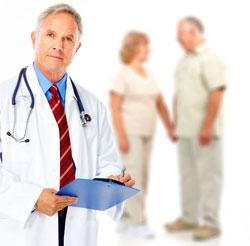A colonoscopy is a test used to examine your large intestine for signs of cancer and find the cause of other problems, such as abdominal pain. Initial colonoscopies are recommended at age 50, although they are used at any age to diagnose a gastrointestinal problem.  Gastroenterologist Glenn D. Madokoro, M.D., of Newport Beach, CA, is here to share information about the colonoscopy process.
Gastroenterologist Glenn D. Madokoro, M.D., of Newport Beach, CA, is here to share information about the colonoscopy process.
Why is colonoscopy prep so important?
Your Newport Beach gastroenterologist inserts a thin, flexible, lighted tube with a camera into your anus during your colonoscopy. As he gently guides the colonoscope through your colon, the camera transmits images to a monitor. If any fecal matter remains in your colon, your doctor won't be able to see the lining clearly. During colonoscopy prep, you'll clean out your colon with laxatives. Although you might find the process a little unpleasant, it's an absolutely crucial step.
What happens during a colonoscopy?
Before the procedure starts, you will be given a sedative or undergo general anesthesia to ensure that your body is completely relaxed during the procedure. You'll lie on your side while your gastroenterologist places the tube in your anus and guides it through your rectum and colon. The scope not only takes video images of your colon; it also pumps air into your colon to give Dr. Madokoro a clear view of the lining. Once the scope reaches the opening to your small intestine, your doctor will slowly withdraw it and take a second look at the lining of your colon.
What if a polyp is found during the colonoscopy?
Polyps are small growths on the lining of the colon walls that can eventually become cancerous. In addition to sending images of your colon to a monitor, the colonoscope can also be used to remove polyps. Any polyps removed during the procedure are sent to a laboratory for testing. You may notice some light bleeding after the colonoscopy if you have a polyp removed.
What is the colonoscopy recovery process like?
Plan to spend at least an hour or two at the outpatient center or hospital following a colonoscopy. During this time, the effects of the sedative or anesthesia will wear off and the medical staff will monitor you to make sure you aren't experiencing any issues. Someone will need to drive you home if you've had anesthesia. You may pass gas for a few hours after the procedure, but by the next day, you should feel completely normal.
Make your colon health a priority this year! Schedule a colonoscopy appointment with Newport Beach, CA, gastroenterologist Glenn D. Madokoro, M.D. by calling (949) 548-8800.